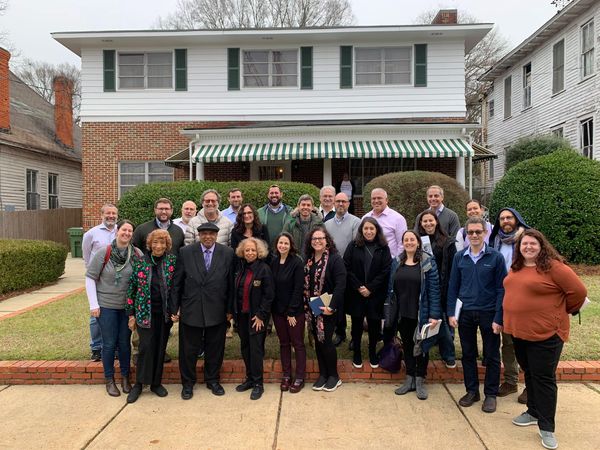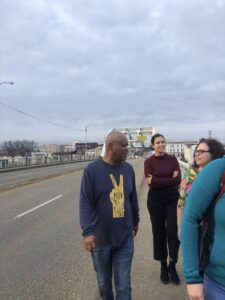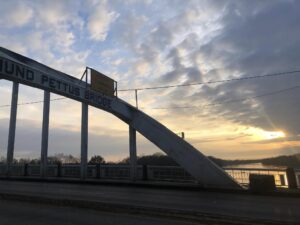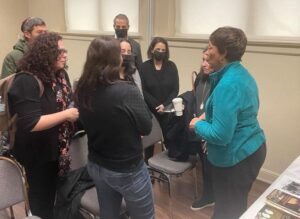
Jewish Federation’s Rabbinic and communal Leaders Mission visit Harris House in Montgomery, AL, the Safe House for the Freedom Riders during the Civil Rights Movement of the 1960s.
 Tuesday, we spent the day in Selma. Terry Chestnut guided us through landmarks and neighborhoods, giving testimony and sharing stories of the relationships, woven like a hammock, that hold him still today. His father was J.L. Chestnut, Jr, the first Black lawyer in Selma, who represented Dr. Martin Luther King and was a key figure in the Civil Rights movement, fighting for voting rights and pursuing justice for Black farmers. Terry tells us about his father’s brilliant mind and his musical gifts. Terry shares how he was there with his father on Bloody Sunday, a six year old boy. The violence he witnessed on that day shakes him still. Terry led us across the Edmund Pettus bridge
Tuesday, we spent the day in Selma. Terry Chestnut guided us through landmarks and neighborhoods, giving testimony and sharing stories of the relationships, woven like a hammock, that hold him still today. His father was J.L. Chestnut, Jr, the first Black lawyer in Selma, who represented Dr. Martin Luther King and was a key figure in the Civil Rights movement, fighting for voting rights and pursuing justice for Black farmers. Terry tells us about his father’s brilliant mind and his musical gifts. Terry shares how he was there with his father on Bloody Sunday, a six year old boy. The violence he witnessed on that day shakes him still. Terry led us across the Edmund Pettus bridge at sunset – following the path of those who prayed with their feet, who lifted up their voices and put their bodies on the line for freedom and justice.
at sunset – following the path of those who prayed with their feet, who lifted up their voices and put their bodies on the line for freedom and justice. 16th Street Church, where she is the first female president of the board, where she survived the horrific bombing on September 15th 1963 and grieved the loss of her four friends, Addie Mae Collins (14), Cynthia Wesley (14), Carole Robertson (14), and Carol Denise McNair (11). She couldn’t talk about it for 25 years. Nobody talked about it in the community. It hurt too much. There is a statue of the girls in the park across from the church. Dr. McKinistry remembered sitting in the pews preparing for the Children’s March the spring before, how she and her friends sang to God and pledged to pray for the success of the movement.
16th Street Church, where she is the first female president of the board, where she survived the horrific bombing on September 15th 1963 and grieved the loss of her four friends, Addie Mae Collins (14), Cynthia Wesley (14), Carole Robertson (14), and Carol Denise McNair (11). She couldn’t talk about it for 25 years. Nobody talked about it in the community. It hurt too much. There is a statue of the girls in the park across from the church. Dr. McKinistry remembered sitting in the pews preparing for the Children’s March the spring before, how she and her friends sang to God and pledged to pray for the success of the movement.